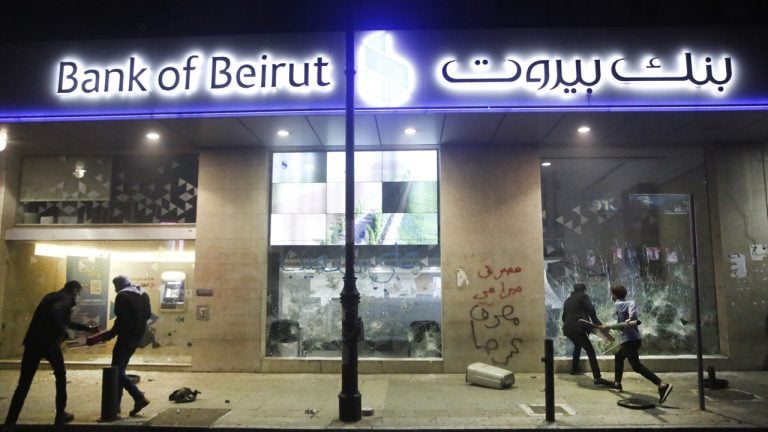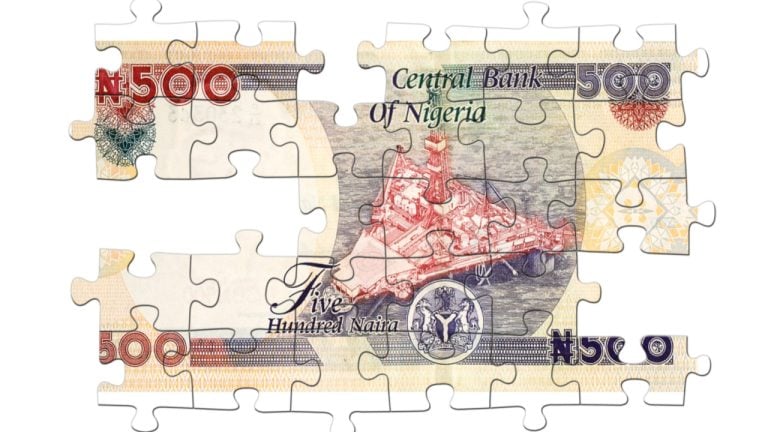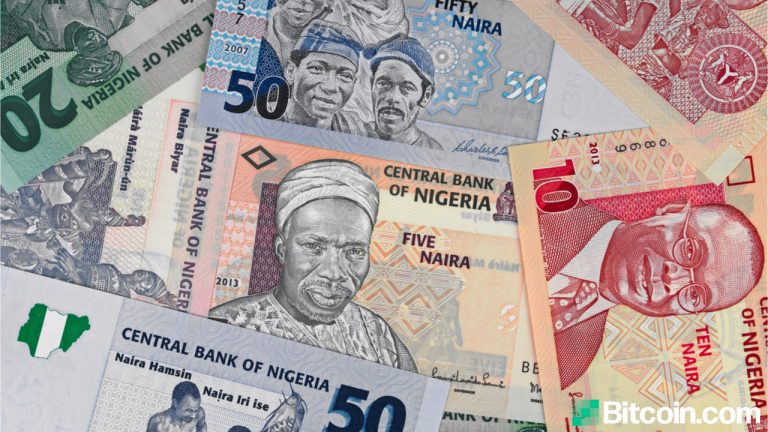 Investigative journalist James Corbett has recently referred to the ongoing global banking crisis involving SVB, Signature Bank, Credit Suisse and others as the “Panic of 2023,” drawing comparisons to what he views as historical precedents, and pointing ahead to an inevitable and bleak, technocratic surveillance future leveraging central bank digital currencies (CBDCs) should nothing be […]
Investigative journalist James Corbett has recently referred to the ongoing global banking crisis involving SVB, Signature Bank, Credit Suisse and others as the “Panic of 2023,” drawing comparisons to what he views as historical precedents, and pointing ahead to an inevitable and bleak, technocratic surveillance future leveraging central bank digital currencies (CBDCs) should nothing be […] On Dec. 17, reports detail that residents in Lebanon have been staging sit-ins and protests at banks in order to access their own savings accounts. Since the economic collapse in 2019, Lebanon’s banks froze Lebanese bank accounts, and a number of branches have remained closed indefinitely. The deprivation of wealth has caused a few impoverished […]
On Dec. 17, reports detail that residents in Lebanon have been staging sit-ins and protests at banks in order to access their own savings accounts. Since the economic collapse in 2019, Lebanon’s banks froze Lebanese bank accounts, and a number of branches have remained closed indefinitely. The deprivation of wealth has caused a few impoverished […]
The blockchain security firm has uncovered a new tactic used by crypto scammers as the industry continues to improve its fraud detection capabilities.
Crypto scammers have been accessing a “cheap and easy” black market of individuals willing to put their name and face on fraudulent projects — all for the low price of $8, blockchain security firm CertiK has uncovered.
These individuals, described by CertiK as “Professional KYC actors” would, in some cases, voluntarily become the verified face of a crypto project, gaining trust in the crypto community prior to an “insider hack or exit scam.”
Other uses of these KYC actors include using their identities to open up bank or exchange accounts on behalf of the bad actors.
According to a Nov. 17 blog post, CertiK analysts were able to find over 20 underground marketplaces hosted on Telegram, Discord, mobile apps, and gig websites to recruit KYC actors for as low as $8 for simple “gigs” like passing the KYC requirements “to open a bank or exchange account from a developing country.”
Pricier jobs involve the KYC actor putting their face and name on a fraudulent project. CertiK noted that most actors are seemingly exploited as they are based in developing countries “with an above-average concentration in South-East Asia” and paid around $20 or $30 per role.
Meanwhile, more complex requirements or verification processes could fetch an even higher asking price, particularly if the KYC actors are residents of countries considered a low money laundering risk.
Some roles paid up to $500 a week if an actor was to play the role of CEO for a malicious project but the KYC actor market was “marginal” compared to the market for already KYCed bank and crypto exchange accounts according to CertiK.
Crypto to fiat — or vice-versa — conversions were also cited as a significant percentage of the transactions seen on these marketplaces with CertiK calculating that more than 500,000 members in marketplace sizes ranging from 4,000 to 300,000 were buyers and sellers on these black markets.
Related: Scary stats: $3B stolen in 2022 as of ‘Hacktober,’ doubling 2021
CertiK warned that over 40 websites claiming to vet crypto projects and offer “KYC badges” are “worthless” as the services are “too superficial to detect fraud or simply too amateur to detect insider threats.”
They added the teams behind these websites are “missing the needed “investigation methodology, training, and experience” meaning these badges are then leveraged by scammers to mislead the community and investors.
That being said, the industry has been working hard and is gaining ground in its fight against crypto scammers. A tool released in October by traditional finance giant Mastercard combines artificial intelligence and blockchain data to help find and prevent fraud.
Contrary to popular belief, the open nature of blockchain transactions means it’s harder for fraudsters to hide the movement of funds. Another recent example has been the work of French authorities using on-chain analysis to find and charge five people who stole nonfungible tokens (NFT) through a phishing scam.
 Nigeria’s Economic and Financial Crimes Commission (EFCC) recently claimed it had identified individuals and organizations whose rapid accumulation of U.S. dollars recently accelerated the depreciation of the local currency, a report said. According to Abdulrasheed Bawa, the EFCC chairman, his organization is currently going after foreign currency speculators in Kano, Lagos, Port Harcourt, Enugu, and […]
Nigeria’s Economic and Financial Crimes Commission (EFCC) recently claimed it had identified individuals and organizations whose rapid accumulation of U.S. dollars recently accelerated the depreciation of the local currency, a report said. According to Abdulrasheed Bawa, the EFCC chairman, his organization is currently going after foreign currency speculators in Kano, Lagos, Port Harcourt, Enugu, and […]
The biggest pain points in events ticketing could prove to be a flagship use case of blockchain-based nonfungible tokens, according to industry leaders.
The 2022 Champions League final will have a checkered position in the competition’s history book. Real Madrid emerged victorious over Liverpool inside the Stade de France, but the pandemonium outside the stadium before kick-off highlights the need for innovative solutions to events ticketing.
Counterfeit tickets played a massive role in the chaotic scenes that played out in the French capital in June 2022, as fans broke into the stadium precinct while authorities rebuffed many. French authorities estimated that 35,000 people had arrived at France’s national stadium with fake tickets or none at all, in addition to the 75,000 fans that had legitimate tickets for the grand final.
Black market ticket sales and touting have been part and parcel of the sporting and events world for decades, but the advent of blockchain-powered ticketing looks to be a promising solution. Nonfungible tokens (NFTs) are multi-faceted in that they ensure the credibility of tickets and enable Internet-of-Things (IoT) functionality while also serving as a unique digital collectible to commemorate an event.
The NFL has already tested the waters with NFT ticketing, having distributed around 250,000 NFT tickets after launch in November 2021. Fans that attended the NFL’s Super Bowl LVI were also eligible for commemorative NFT tickets — all at no cost. How that NFT ticket looks and what it incorporates are up to the creators. The NFL’s NFT tickets are minted on the Polygon blockchain and feature different animated visual elements.
The French envoy for the 2024 Paris Olympics has also suggested the use of NFT ticketing solutions to manage attendance for the events, as well as a trial run at the 2024 Rugby World Cup, which will also be hosted in the country.
NFTs are multi-faceted in that they ensure the credibility of tickets and enable IoT functionality while also serving as a unique digital collectible to commemorate an event. How that NFT ticket looks and what it incorporates are up to the creators. The NFL’s NFT tickets are minted on the Polygon blockchain and feature different animated visual elements.
Cointelegraph reached out to a handful of industry participants that already make use of blockchain-based NFT ticketing to gauge the impact of the technology.
Amsterdam-based event technology firm GET Protocol issues tickets that are minted as NFTs on the Polygon blockchain when a user buys a ticket in their mobile app. Tickets are tied to mobile numbers, which is a key part of eliminating ticket touting.
Related: There’s more to NFTs than just PFPs — 5 ways nonfungible tokens will transform society
Users can claim the actual NFT when they scan the ticket QR code at the given event, which links to their GET Protocol wallet. This is where digital collectibles and other exclusive benefits can be extended to users.
Colby Mort, who heads up NFT strategy at the company, told Cointelegraph that NFT tickets help add transparency to what is traditionally a “blackbox” industry. All tickets are transparently viewable in real time, which helps prove ticket authenticity, given the immutability of the underlying system
The secondary sale market is also formalized. Tickets can only be resold within the system, giving organizers control of tickets, revenue, data and direct contact with holders. Tickets are also given extended life cycles, both pre- and post-events, with GET Protocol exploring decentralized event financing for an upcoming Lewis Capaldi art show in Iceland. This explores fundraising initiatives with technology that could benefit smaller artists and creatives.
Digital collectibility is a major feature of post-event NFT utility but Mort also pointed to its potential as a community-building tool for artists and event hosts.
“NFT Ticketing for a lot of mainstream audiences is the 'light bulb moment' of understanding the underlying utility of an NFT combined with the familiarity of the collectible side of NFTs as all NFT Tickets can include a digital collectible.”
Josh Katz, CEO of NFT marketplace YellowHeart, told Cointelegraph the ticket industry is plagued by issues around authenticity and scalping which are mainly driven by the ease of forging or replicating paper tickets with modern hardware.
The finite element and exclusivity of tickets also results in mass reselling at inflated prices. Katz noted that the online ticketing market is expected to be valued at $68 billion by 2025, while secondary sales could generate $15 billion in sales of which organizers and artists forgo their rightful share:
“NFTs, on the other hand, can help solve most — if not all — of these issues. For one, the open and transparent nature of blockchains makes it extremely easy to verify the provenance and authenticity of NFT tickets, so it’s substantially harder for scammers to fool people.”
Kats also highlighted the freely programmable nature of the smart contracts powering NFTs, bringing dynamic benefits to holders and issuers. This also addresses secondary market sales, where NFTs can be programmed to deliver a percentage of sales to the artist or event organizer.
Mort insists that a focus on form and function has been important for their ticketing solution’s success to date. Ticket buyers use fiat currency to purchase tickets linked to bank accounts or cards and access and interact with their NFTs through an app.
“Since our inception in 2016, we've prioritised abstracting away the complexity of blockchain and NFT technology, but over the last year we've seen a huge demand from ticketing companies and event organisers to explore the Web3 side of their ticketing with post-event NFT claiming.”
GET Protocol was built to be blockchain agnostic, given that customers and clients will use the event and ticketing marketplace without having to understand the underlying technology.
Striking a balance that ensures ease of access for new users while harnessing the programmability, utility and immutability of blockchain technology is a key theme highlighted by both Mort and Katz in the adoption of NFT ticketing.
 Following threats from the Central Bank of Nigeria (CBN), the management of Abokifx, a website that tracks the Nigerian currency’s black market exchange rates, has announced the suspension of their daily updates. This suspension will remain in effect until Abokifx gets “better clarity of the situation,” management said on September 17, 2021. Tracking of Parallel […]
Following threats from the Central Bank of Nigeria (CBN), the management of Abokifx, a website that tracks the Nigerian currency’s black market exchange rates, has announced the suspension of their daily updates. This suspension will remain in effect until Abokifx gets “better clarity of the situation,” management said on September 17, 2021. Tracking of Parallel […] The Nigerian naira currency lost further ground against major currencies after it depreciated to 493 nairas for one dollar on the black market on May 25, 2021. Before the latest depreciation, the currency had stabilized at around 485 nairas to the dollar. This was shortly after the exchange rate dropped to a three and a […]
The Nigerian naira currency lost further ground against major currencies after it depreciated to 493 nairas for one dollar on the black market on May 25, 2021. Before the latest depreciation, the currency had stabilized at around 485 nairas to the dollar. This was shortly after the exchange rate dropped to a three and a […] In a possible policy shift, the Central Bank of Nigeria (CBN) recently allowed the local naira currency to briefly drop to a new low of USD$1 for 419.75 nairas on May 14, 2021. However, by close of business the naira had recovered and was trading around 411.25. Before the latest adjustment, the naira had fluctuated […]
In a possible policy shift, the Central Bank of Nigeria (CBN) recently allowed the local naira currency to briefly drop to a new low of USD$1 for 419.75 nairas on May 14, 2021. However, by close of business the naira had recovered and was trading around 411.25. Before the latest adjustment, the naira had fluctuated […]